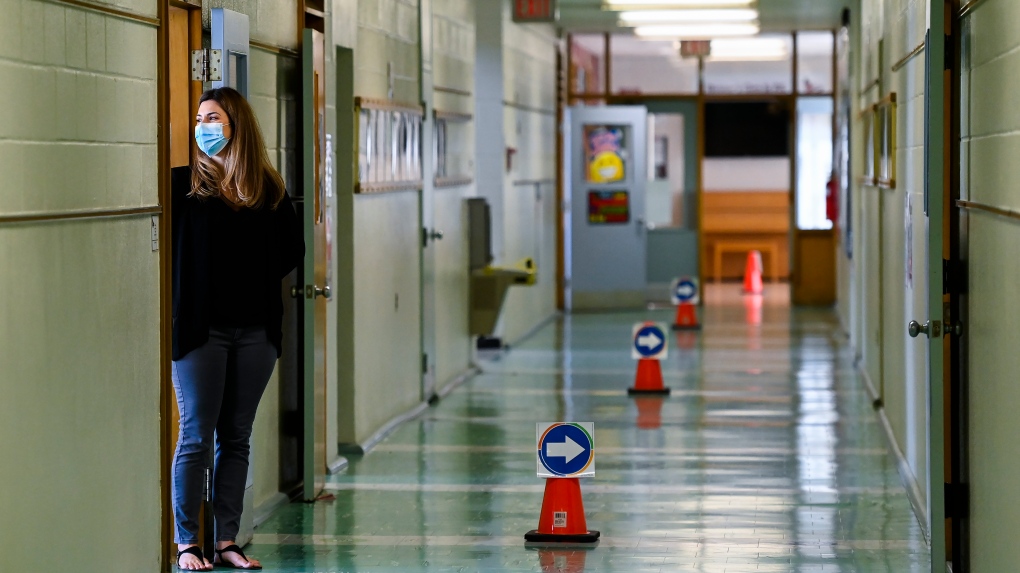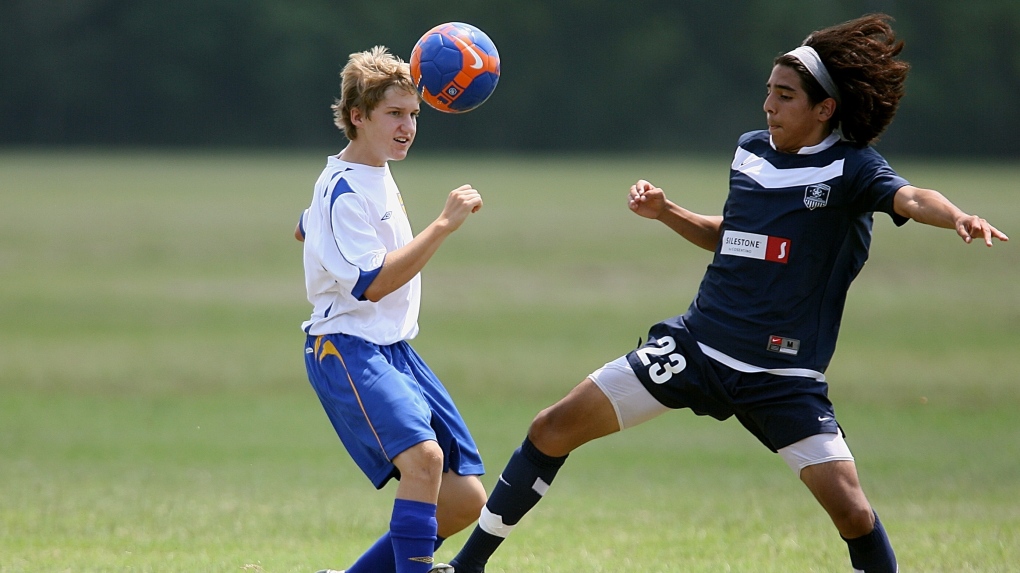Ontario unveils back-to-school plan for September. Here's what you need to know
All students will be able to return to the classroom full time this September under the Ontario government's highly anticipated back-to-school plan.
The 26-page plan, which the Doug Ford government originally promised to release in July, says elementary students and secondary students will attend school in-person five days per week, for the first time in months.
Remote learning will remain an option for parents and students who don’t feel comfortable returning to the classroom.
Masks will be mandatory for all students between Grade 1 and Grade 12, and will remain optional – but recommended – for children in kindergarten. They are not required outdoors.
In the plan, the government said school boards must be prepared for a potential closures and have plans in place so all students can pivot to remote learning if the COVID-19 situation worsens.
However, when asked what would prompt such a school closure, Ontario Chief Medical Officer Dr. Kieran Moore said Tuesday that he doesn’t expect to have to shutter classrooms.
“I really don’t see our schools closing going into the fall and winter and spring,” he said. “I really can’t envision or see any closures of any schools in Ontario, or colleges or universities.”
“It’s great news for our kids. They will be back with their classmates, where they can get back to activities like music and theater and sports and develop those friendships that can last a lifetime…but it’s also important to do so cautiously and carefully.”
Neither Ford nor Education Minister Stephen Lecce are expected to speak publicly about the back-to-school plan today.
The guidance released Tuesday did not provide parents with answers to some of their key questions, like how schools will deal with COVID-19 outbreaks or whether there will be different rules for vaccinated children.
That information is still all "forthcoming," the government said.
ELEMENTARY SCHOOL
Students in kindergarten though to Grade 8 will remain in one cohort for the full day with one teacher, the government says.
Members of different cohorts will be allowed to interact outside, with distancing encouraged, or inside with distancing and masks, the government says.
 Grade two teacher Vivian Mavraidis looks out into the hallways at Hunter's Glen Junior Public School which is part of the Toronto District School Board (TDSB) during the COVID-19 pandemic in Scarborough, Ont., on Monday, September 14, 2020. THE CANADIAN PRESS/Nathan Denette
Grade two teacher Vivian Mavraidis looks out into the hallways at Hunter's Glen Junior Public School which is part of the Toronto District School Board (TDSB) during the COVID-19 pandemic in Scarborough, Ont., on Monday, September 14, 2020. THE CANADIAN PRESS/Nathan Denette
Elementary school students will be allowed to use common spaces like libraries and cafeterias.
Specialized education staff, like French teachers, are permitted to go into different classrooms and multiple schools where necessary.
SECONDARY SCHOOL
While secondary students will be returning to the classroom for the full duration of the day, school boards have been instructed to timetable students with no more than two courses at a time for the fall semester.
The government says this will allow them the option to revert more easily to restrictive measures if that becomes necessary.
Exceptions to the two-course rule may be made for small schools where contacts can be limited by cohorting grades, the government says.
There will be five instructional hours per day for secondary students.
PROTECTIVE STRATEGIES
The government says no specific measure will prevent transmission of COVID-19, but says a combination of many efforts will keep children safe.
Non-medical masks will be required for students Grade 1 to 12 and must be worn in hallways, classrooms, and school vehicles.
Masks may only be temporarily removed when taking part in low-contact physical activity or when consuming food and drink, the government says. Students from other cohorts may eat lunch together without distancing outdoors, but must remain two metres from other cohorts while indoors.
Students are not required to wear masks outdoors.
Meanwhile, all staff and students will be required to self-screen each day for symptoms before arriving at school. Anyone experiencing symptoms of COVID-19 must not attend school and must get tested.
The Ministry of Education said they may direct school boards to perform on-site daily confirmation of self-screening, especially during a period of potentially higher transmission. They have not said how they will confirm students have completed self-screening.
School boards will continue to provide personal protective equipment to school staff and bus drivers, the government says.
Medical-grade masks are required to be worn by school staff and visitors. School staff is also advised to wear eye protection.
Schools are also being told to properly train students on how to wash their hands and practice proper respiratory etiquette.
The government says that distancing should be promoted as much as possible during the school day.
Schools are being told to develop an arrival and departure plan so that congregating in busy areas is avoided where possible.
School boards will also be responsible for developing a cleaning plan, which includes frequent disinfecting of high-touch surfaces.
During recess, the government says students don't need to stay within their cohort, but distancing will be encouraged as much as possible.
The government says the risk of COVID-19 transmission by using a shared object is low, therefore shared materials will be allowed, along with the use of shared spaces like libraries and computer labs. School assemblies will also be permitted.
Meanwhile, the government has told the school boards they are responsible for optimizing air quality in the classroom.
Schools with full mechanical ventilation are expected to have the system checked before the start of the school year and calibrate the HVAC systems for maximum air flow and increased fresh air intake.
Schools without full mechanical ventilation are expected to place standalone HEPA filter units in all classrooms.
Outdoor learning is encouraged wherever possible.
SCHOOL SPORTS, CLUBS ALLOWED
As part of the government’s plan, school sports and clubs are allowed to resume in September.
Cohorts can interact with each other, with physical distancing encouraged, during these times.
For inter-school sports, high-contact activities are only allowed outdoors and masking is not required.
 Kids heading a soccer ball during a game (Pexels)
Kids heading a soccer ball during a game (Pexels)
Low-contact activities are permitted indoors. The government says masking is encouraged but not required indoors if a minimum distance of two metres can be maintained between individuals who are not part of the same classroom cohort.
Music programs are also permitted in areas with adequate ventilation, such as outdoors or in a gym. This includes singing and the playing of wind instruments.
“We absolutely understand the risk of aerosolization, but communities keep their risk low, their immunization rates high, everyone screens appropriately on a daily basis. These area risks that I think we should take because they are small risks,” Moore told reporters.
“We can never eliminate the risk completely. We have to balance our social, mental, physical well being and I think music is important to all children.”
ARE SNOW DAYS BEING CANCELLED?
The government said that school boards must implement an inclement weather plan that may include pivoting to remote learning on days when students can’t access the classroom in-person.
This plan will also apply to days where it is too hot for students to attend school in-person.
Meanwhile, there will be no capacity limits on school buses or transportation vehicles.
Masks are required at all times when on the bus and students will be given assigned seating.
Vehicles for elementary schools should operate at reduced capacity where possible, the government says.
DEALING WITH OUTBREAKS
The government says the section in the back-to-school plan about managing cases and outbreaks in schools is still "forthcoming," but will build on the previous school year.
Last month, Moore said that unvaccinated students would face different isolation requirements if they come in contact with a positive case.
Students in Ontario have not been learning in-person since April, when the third wave was spiralling out-of-control in the province.
As cases declined, Ford decided to reopen the economy before allowing students to return to class.
CTVNews.ca Top Stories

Quebec nurse had to clean up after husband's death in Montreal hospital
On a night she should have been mourning, a nurse from Quebec's Laurentians region says she was forced to clean up her husband after he died at a hospital in Montreal.
Cuban government apologizes to Montreal-area family after delivering wrong body
Cuba's foreign affairs minister has apologized to a Montreal-area family after they were sent the wrong body following the death of a loved one.
What is changing about Canada's capital gains tax and how does it impact me?
The federal government's proposed change to capital gains taxation is expected to increase taxes on investments and mainly affect wealthy Canadians and businesses. Here's what you need to know about the move.
'Anything to win': Trudeau says as Poilievre defends meeting protesters
Prime Minister Justin Trudeau is accusing Conservative Leader Pierre Poilievre of welcoming 'the support of conspiracy theorists and extremists,' after the Conservative leader was photographed meeting with protesters, which his office has defended.
Northern Ont. lawyer who abandoned clients in child protection cases disbarred
A North Bay, Ont., lawyer who abandoned 15 clients – many of them child protection cases – has lost his licence to practise law.
'One of the single most terrifying things ever': Ontario couple among passengers on sinking tour boat in Dominican Republic
A Toronto couple are speaking out about their 'extremely dangerous' experience on board a sinking tour boat in the Dominican Republic last week.
Boeing's financial woes continue, while families of crash victims urge U.S. to prosecute the company
Boeing said Wednesday that it lost US$355 million on falling revenue in the first quarter, another sign of the crisis gripping the aircraft manufacturer as it faces increasing scrutiny over the safety of its planes and accusations of shoddy work from a growing number of whistleblowers.
Bank of Canada officials split on when to start cutting interest rates
Members of the Bank of Canada's governing council were split on how long the central bank should wait before it starts cutting interest rates when they met earlier this month.
Fair in Ontario, flurries in Labrador: Weather systems make for an erratic spring
It's no secret that spring can be a tumultuous time for Canadian weather, and as an unseasonably mild El Nino winter gives way to summer, there's bound to be a few swings in temperature that seem out of the ordinary. From Ontario to the Atlantic, though, this week is about to feel a little erratic.
































